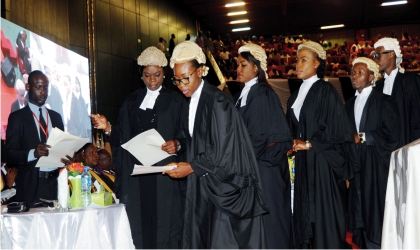Editorial
Law School: Realising PH Campus

As a campus of the Nigerian Law School is set to be formally established in Rivers State after the Council of Legal Education (CLE) officially approved the request by the Rivers State Government, stakeholders and legal doyens have been in a celebratory mood, describing it as a rather excellent and courageous undertaking.
Governor Nyesom Wike had anxiously implored the Council to grant a go-ahead to establish a law school in the state during a visit to the Yenagoa campus a few weeks ago. The letter of approval for the Port Harcourt campus was subsequently presented to the Governor recently at the Government House, Port Harcourt, during a visit by the Council led by its chairman, Emeka Ngige.
It is not in doubt that the proposed law school is going to be a feat of courage. Its conception and development have timely arrived. Consequently, Rivers people are urged to support the state government to realise the primary objectives of the proposed school. This is another independent confirmation that Wike did not simply jump into governance; he had a well-drawn blueprint for the development of education in the state.
There is a need to commend or applaud the Federal Government for granting approval to the request by Rivers State, particularly for not associating the request with politics as many would like them to do. We ask them to go beyond mere endorsement of the institution to nurture the campus to become a reputable citadel of learning.
Successfully establishing a law school in Port Harcourt is an audacious step towards improving legal education in the country. It may correctly address the lack of carrying capacity of existing campuses and also broaden the chances of qualified applicants seeking admission into the Nigerian Law School. It is hoped that the new campus would effectively promote legal education and re-establish Rivers State on the map as the centre of legal education in the country.
Unfortunately, the offer to establish a Nigerian Law School campus was earlier made to the Rivers State Government under the previous administration, but for inexplicable reasons, the proposal was soundly rejected. It is, therefore, reassuring to Rivers people that the Wike administration has corrected the injustice done to the state by the previous administration with a campus of the school in the state.
Unarguably, Governor Wike has been demonstrating substantial interest in the development of legal education in the state and the nation. In a recent gesture, the state government actively committed a humongous sum of money to the development of facilities at the Yenagoa campus of the Nigerian Law School. Two hostel blocks and a 1,500-seat auditorium in the law school were constructed.
Also, during his time as Minister of State for Education, Wike established the long-anticipated Faculty of Law in the University of Port Harcourt. The faculty was long overdue in an institution of the stature of UNIPORT, which has enough manpower and institutional experience to run it to international specifications. Then in 2019, the Governor generously supported the completion of the law faculty complex of the University with N200 million.
Although persistent critics of the administration have been politicising the gesture and seeing the project as a largely misplaced priority with little or no economic value, we strongly think otherwise. Because our society, our economy and our moral values keep changing, there is a need for more law schools to train additional lawyers who would take all this into account. Besides, the new law school would create jobs, promote social development, and enhance the law economy of the state.
However, when fully established, we would like to see not just a law school with elegant edifices bearing state-of-the-art facilities, but one that can truly educate future lawyers and make them think critically as legal practitioners. Indeed, we would like to see lawyers that will be properly exposed to a wide range of legal subjects with a broad array of perspectives that will enhance their work as well as legal skills, ranging from economics to legal philosophy to a comprehension of empirical and social science data.
Regrettably, many practising lawyers, produced by the universities and the Nigerian Law School, are intellectually deficient, hence, undeserving of the title. This reprehensible descent of some lawyers into poor intellectual exhibition must be reversed. Nigerian Law School must set a high standard for future legal minds. Since lawyers play a central role in society, the government has an enormous amount of responsibility to educate them well before unleashing them on our citizens.
Since the establishment of the law school in Port Harcourt may lead to expansion of admission quota for the law programme in all the nation’s universities offering the discipline, Rivers people can now brace up and pursue a career in the legal profession in proper utilisation of the ample opportunity they have now to undergo the programme. This implies that they must work harder to merit admission.
We consider the six months time frame for the completion of the project as plausible and realistic, but the big elephant in the room is for both the state government and the contractor to comply strictly with the contract terms. While we urge the contractor to work extremely hard to deliver on the expected date, the state government must not fail to keep its side of the bargain. This way, the project might witness a very auspicious delivery.
Editorial
Beginning A New Dawn At RSNC

Editorial
Sustaining OBALGA’s Ban On Street Trading

Editorial
AFCON ’25: Bravo, Super Eagles, But…


